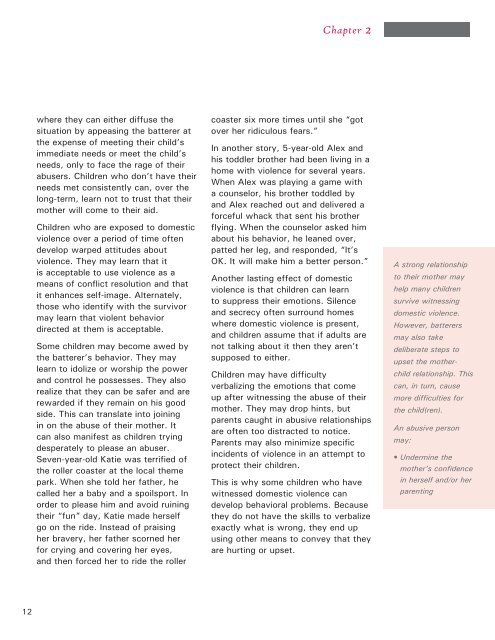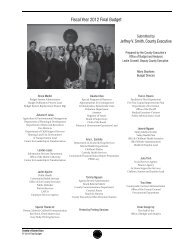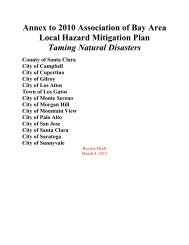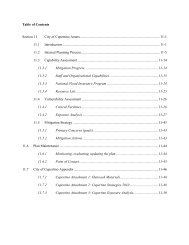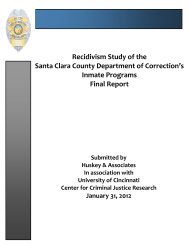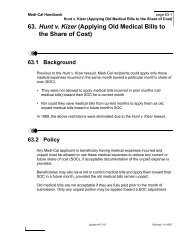Through Their Eyes: Domestic Violence and It's Impact on Children
Through Their Eyes: Domestic Violence and It's Impact on Children
Through Their Eyes: Domestic Violence and It's Impact on Children
Create successful ePaper yourself
Turn your PDF publications into a flip-book with our unique Google optimized e-Paper software.
Chapter 2<br />
where they can either diffuse the<br />
situati<strong>on</strong> by appeasing the batterer at<br />
the expense of meeting their child’s<br />
immediate needs or meet the child’s<br />
needs, <strong>on</strong>ly to face the rage of their<br />
abusers. <strong>Children</strong> who d<strong>on</strong>’t have their<br />
needs met c<strong>on</strong>sistently can, over the<br />
l<strong>on</strong>g-term, learn not to trust that their<br />
mother will come to their aid.<br />
<strong>Children</strong> who are exposed to domestic<br />
violence over a period of time often<br />
develop warped attitudes about<br />
violence. They may learn that it<br />
is acceptable to use violence as a<br />
means of c<strong>on</strong>flict resoluti<strong>on</strong> <str<strong>on</strong>g>and</str<strong>on</strong>g> that<br />
it enhances self-image. Alternately,<br />
those who identify with the survivor<br />
may learn that violent behavior<br />
directed at them is acceptable.<br />
Some children may become awed by<br />
the batterer’s behavior. They may<br />
learn to idolize or worship the power<br />
<str<strong>on</strong>g>and</str<strong>on</strong>g> c<strong>on</strong>trol he possesses. They also<br />
realize that they can be safer <str<strong>on</strong>g>and</str<strong>on</strong>g> are<br />
rewarded if they remain <strong>on</strong> his good<br />
side. This can translate into joining<br />
in <strong>on</strong> the abuse of their mother. It<br />
can also manifest as children trying<br />
desperately to please an abuser.<br />
Seven-year-old Katie was terrified of<br />
the roller coaster at the local theme<br />
park. When she told her father, he<br />
called her a baby <str<strong>on</strong>g>and</str<strong>on</strong>g> a spoilsport. In<br />
order to please him <str<strong>on</strong>g>and</str<strong>on</strong>g> avoid ruining<br />
their “fun” day, Katie made herself<br />
go <strong>on</strong> the ride. Instead of praising<br />
her bravery, her father scorned her<br />
for crying <str<strong>on</strong>g>and</str<strong>on</strong>g> covering her eyes,<br />
<str<strong>on</strong>g>and</str<strong>on</strong>g> then forced her to ride the roller<br />
coaster six more times until she “got<br />
over her ridiculous fears.”<br />
In another story, 5-year-old Alex <str<strong>on</strong>g>and</str<strong>on</strong>g><br />
his toddler brother had been living in a<br />
home with violence for several years.<br />
When Alex was playing a game with<br />
a counselor, his brother toddled by<br />
<str<strong>on</strong>g>and</str<strong>on</strong>g> Alex reached out <str<strong>on</strong>g>and</str<strong>on</strong>g> delivered a<br />
forceful whack that sent his brother<br />
flying. When the counselor asked him<br />
about his behavior, he leaned over,<br />
patted her leg, <str<strong>on</strong>g>and</str<strong>on</strong>g> resp<strong>on</strong>ded, “It’s<br />
OK. It will make him a better pers<strong>on</strong>.”<br />
Another lasting effect of domestic<br />
violence is that children can learn<br />
to suppress their emoti<strong>on</strong>s. Silence<br />
<str<strong>on</strong>g>and</str<strong>on</strong>g> secrecy often surround homes<br />
where domestic violence is present,<br />
<str<strong>on</strong>g>and</str<strong>on</strong>g> children assume that if adults are<br />
not talking about it then they aren’t<br />
supposed to either.<br />
<strong>Children</strong> may have difficulty<br />
verbalizing the emoti<strong>on</strong>s that come<br />
up after witnessing the abuse of their<br />
mother. They may drop hints, but<br />
parents caught in abusive relati<strong>on</strong>ships<br />
are often too distracted to notice.<br />
Parents may also minimize specific<br />
incidents of violence in an attempt to<br />
protect their children.<br />
This is why some children who have<br />
witnessed domestic violence can<br />
develop behavioral problems. Because<br />
they do not have the skills to verbalize<br />
exactly what is wr<strong>on</strong>g, they end up<br />
using other means to c<strong>on</strong>vey that they<br />
are hurting or upset.<br />
A str<strong>on</strong>g relati<strong>on</strong>ship<br />
to their mother may<br />
help many children<br />
survive witnessing<br />
domestic violence.<br />
However, batterers<br />
may also take<br />
deliberate steps to<br />
upset the motherchild<br />
relati<strong>on</strong>ship. This<br />
can, in turn, cause<br />
more difficulties for<br />
the child(ren).<br />
An abusive pers<strong>on</strong><br />
may:<br />
• Undermine the<br />
mother’s c<strong>on</strong>fidence<br />
in herself <str<strong>on</strong>g>and</str<strong>on</strong>g>/or her<br />
parenting<br />
12


